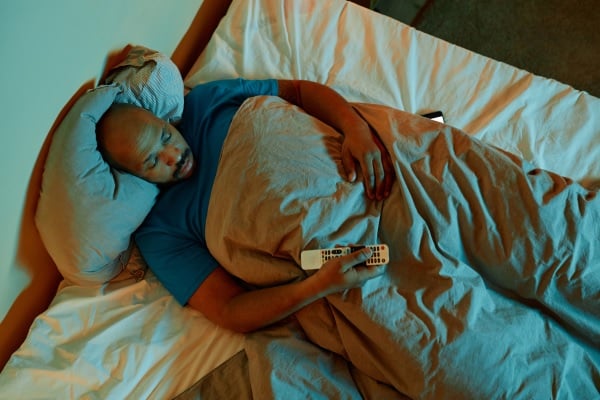The comforting glow of a TV screen often serves as a modern-day lullaby for many. With the press of a button, you can drift into a world of sitcoms, movies, or news, seemingly far removed from the stresses of daily life. While this nightly ritual might offer a sense of comfort and distraction, it’s worth pausing to consider its impact on your sleep and overall well-being. The TV, despite its entertainment value, can have several negative effects that extend beyond just a restless night. This article will explore the science of sleep and the impact of sleeping with a TV on, offering you a comprehensive look at why it might be time to hit the “off” button before bed.
Contents
The Science Of Sleep

Sleep isn’t merely a “break” for your body; it’s a critical function that affects both physical and mental health. During sleep, your body goes through various stages, including REM (Rapid Eye Movement) and non-REM sleep, each contributing to processes like memory consolidation, muscle repair, and immune system strengthening. Disrupting this cycle, even slightly, can lead to a host of problems ranging from poor concentration to heightened risk of chronic conditions like diabetes and heart disease.
Understanding the intricacies of sleep sets the stage for evaluating external factors that can disrupt this natural process. The sleep cycle is a delicate balance of biological mechanisms influenced by hormones like melatonin, which help regulate sleep and wakefulness. External factors like light and sound can significantly impact these mechanisms, leading to a disrupted sleep cycle. This raises the question: How does the TV, a source of both light and sound, fit into this delicate equation?
Impact On Sleep Quality

The presence of artificial light, especially the blue light emitted by TV screens, can interfere with the body’s production of melatonin. Lower levels of melatonin make it harder to fall asleep and stay asleep, leading to a night of tossing and turning. Additionally, the content displayed on the TV can stimulate the brain, making it more challenging to enter a state of relaxation necessary for sleep.
But it’s not just the light; the sound plays a role too. While you might find a dialogue or soundtrack soothing, the sudden changes in volume or even the transition from one show to another can jolt you awake or keep you in lighter stages of sleep. This inconsistent sleep pattern can leave you feeling groggy and unrested the next day, setting a poor foundation for the day ahead.
Long-Term Health Risks

A single night of disrupted sleep might seem harmless, but consistent exposure to the elements that TVs bring into the sleep environment can lead to long-term health issues. For starters, poor sleep quality is a known risk factor for insomnia. Over time, the body finds it increasingly difficult to enter deeper stages of sleep, making you more susceptible to sleep disorders.
Moreover, lack of quality sleep has been linked to weight gain and obesity. The body’s ability to regulate hormones like ghrelin and leptin, which control hunger and fullness, becomes impaired. This can lead to increased appetite and poor decision-making when it comes to food choices, contributing to a vicious cycle of poor health. Elevated stress levels and a heightened risk of conditions like diabetes and heart disease are also among the long-term health risks of poor sleep.
Psychological Effects

The psychological toll of sleeping with the TV on extends beyond just a restless night. The constant exposure to news, drama, or even comedy can stimulate your mind when it should be winding down. This heightened state of mental activity can lead to increased levels of stress and anxiety, making it even more challenging to fall asleep. Over time, this can create a dependency on the TV to initiate sleep, but ironically, the quality of that sleep suffers.
Moreover, the dependency on TV for sleep can lead to a form of behavioral insomnia. This is a condition where the mind associates certain activities or environments with wakefulness, making it difficult to fall asleep without those specific conditions. In this case, the TV becomes a crutch, and the absence of it can create a sense of restlessness, further exacerbating sleep issues.
Impact On Daytime Functionality

The repercussions of poor sleep don’t just end when you finally manage to get out of bed; they extend into your daytime activities as well. Lack of restful sleep can significantly impair focus and productivity. Tasks that would usually be straightforward become cumbersome, and the ability to concentrate diminishes. This can affect performance at work or school, leading to a cycle of stress and even poorer sleep.
In addition to reduced productivity, sleep deprivation can also affect your emotional well-being. You may experience mood swings, irritability, and a general sense of unhappiness. Relationships can suffer, and the ability to cope with everyday challenges diminishes. The cumulative effect of these daytime issues can be detrimental to both personal and professional life.
Effects On Children And Adolescents

Children and adolescents are not immune to the negative impacts of sleeping with the TV on. In fact, the effects can be even more pronounced, given the importance of sleep in developmental stages. A disrupted sleep pattern can lead to problems in academic performance. Lack of restful sleep can affect concentration, memory, and the ability to learn, all of which are crucial for academic success.
Behavioral issues are another concern. Sleep deprivation in younger individuals has been linked to increased irritability, mood swings, and even disorders like ADHD. The constant stimulation from TV can also contribute to a lack of physical activity, leading to issues like childhood obesity. Given these risks, it’s crucial to consider the long-term impact of this seemingly harmless habit.
Alternatives To TV For Better Sleep

Switching off the TV doesn’t mean you’re left with a void; there are several healthier alternatives to help you drift into a peaceful slumber. White noise machines, for instance, can offer a consistent auditory background without the jarring changes that come with TV shows. These machines can mimic sounds like rainfall, ocean waves, or even a bustling cafe, providing a soothing backdrop for sleep.
Another alternative is reading a book. Unlike screens, the light from a reading lamp is far less disruptive to melatonin production. Moreover, reading can be a calming activity that helps your mind transition from the hustle and bustle of the day to a more relaxed state, ready for sleep. Meditation and mindfulness techniques are also effective ways to prepare your body and mind for a restful night, helping you break free from the cycle of dependency on TV for sleep.
Time To Hit The Off Button And Reclaim Your Restful Nights
Sleeping with the TV on might offer temporary comfort, but the long-term consequences on your sleep quality, health, and mental well-being are far from soothing. From disrupting the natural sleep cycle to affecting daytime functionality, the downsides are numerous. Isn’t it time to consider healthier alternatives? Turn off the TV and turn towards a future of restful, rejuvenating sleep. You owe it to yourself.


